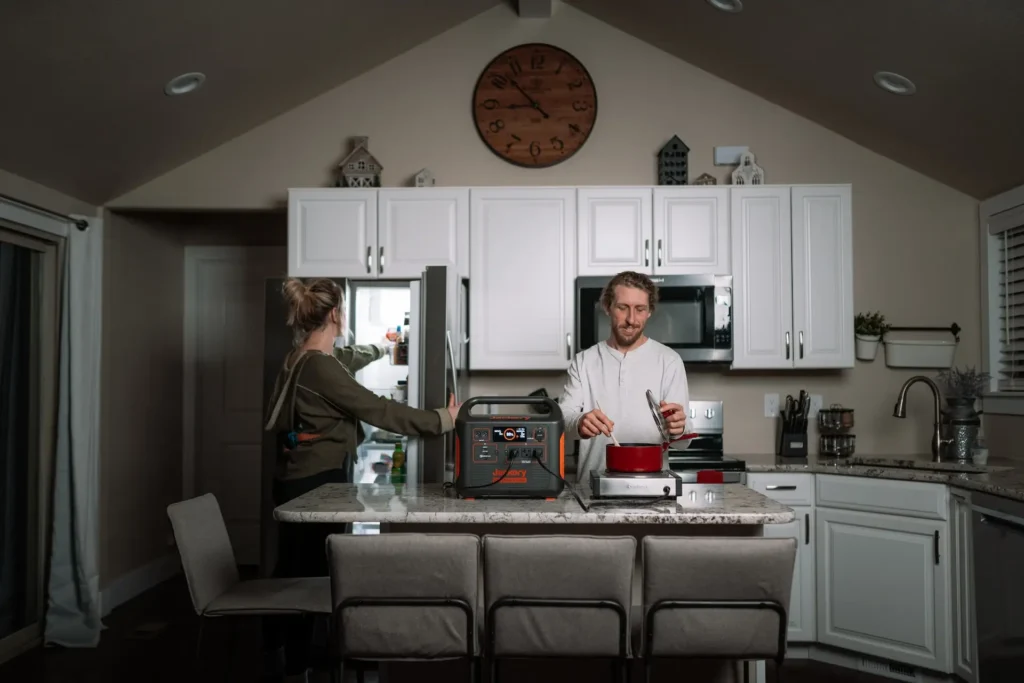Losing power can be a huge inconvenience, but losing the food in your refrigerator can be downright devastating. When an outage strikes, having a backup generator to keep your fridge running should be a top priority.
But with so many options on the market, how do you determine exactly What Size Generator Do I Need To Run A Refrigerator During a Power Outage?

In this comprehensive guide, we’ll walk through the key factors for choosing the ideal generator wattage to keep your refrigerator powered on, even in a blackout.
Follow along to learn how to calculate your refrigerator’s electricity needs, pick the perfect generator type and size, and safely connect everything for reliable backup power.
What Size Generator Do I Need To Run A Refrigerator
Determining Your Refrigerator’s Power Requirements
The first step is figuring out just how much power output your specific refrigerator requires to run efficiently. All refrigerators have a nameplate or technical specs label, usually located inside the door or on the back of the unit. Here you can find two key pieces of information:
- Voltage – The volts your refrigerator needs, typically 120V in the US.
- Amps – The amount of electrical current the refrigerator draws, shown in amperes (amps).
To determine the wattage:
Watts = Volts x Amps
So for example, if your fridge runs on 120 volts and uses 5 amps, the wattage would be:
120 volts x 5 amps = 600 watts
Now that you know the continuous (or “running”) wattage required, there’s one more calculation to make. When a refrigerator first turns on, there is an initial power surge as the compressor motor starts up. This requires 2-3x the running wattage for several seconds.
So in our example, the 600-watt fridge likely requires 1200-1800 surge watts at startup. Knowing both the running and surge wattage is key for proper generator sizing.
As a general guideline, here are the typical power needs for refrigerators:
- Small fridge (up to 10 cubic ft): Runs on 300-500 watts, requires 500-1000 surge watts
- Medium fridge (10-20 cubic ft): Runs on 500-700 watts, requires 1000-1500 surge watts
- Large double-door (20+ cubic ft): Runs on 700-900 watts, requires 1500-2500 surge watts
Of course, your specific model may have different power demands, so checking the data label is a must. New Energy Star-certified refrigerators tend to use less energy than older models.
Choosing the Right Generator Type and Size
Now that you know your refrigerator’s wattage needs, it’s time to select a generator that can handle the load.
Here are the key factors to consider:
Power Output
Choose a generator with a maximum power output that is 20-30% higher than your refrigerator’s running wattage. This provides a cushion for the initial startup surge.
In our example, a 600-watt fridge would need a generator rated for 720-780 watts or more. Allowing that extra capacity prevents overloading the generator during startup.
Many generators also list a “surge wattage” spec, which tells you its maximum short-term output. Try to match that up to your refrigerator’s surge needs.
Fuel Type
The two main options are gasoline and diesel generators. Gasoline models are more common for residential use since they are smaller, lighter, and typically cost less. Diesel generators are heavier duty and more fuel efficient, but also pricier.
For occasional, shorter outages, a gasoline portable generator is usually sufficient for refrigerator runtime. For extended outages or frequent use, the extra power and efficiency of a diesel generator can be worthwhile.
Generator Features
Look for key features that make your generator more suited for refrigerator operation:
- Inverter generator – Provides clean, stable power for sensitive electronics. Refrigerator control boards can be damaged by “dirty” power.
- Accessory plugs – Models with a 12V DC outlet allow you to directly connect appliances to avoid voltage spikes.
- Cold weather kit – For operation in colder climates, a cold weather kit improves starting.
- Quiet operation – Choose an inverter model for minimal noise if located near living areas.
- Warranty – Aim for at least a 2-3 year warranty as an indicator of quality.
Portable or Standby
Portable generators offer flexible placement and can be stored away easily. Just be sure to position the unit outdoors and far from doors/windows to prevent exhaust or fumes from entering your home.
For a more permanent solution, standby generators connect to your home’s fuel line or LP tank and automatically switch on when the power goes out. Though pricier, they are very convenient and safe for extended outages.
Connecting Your Refrigerator Safely to the Generator
Once you have the right generator on hand, it’s extremely important to follow the proper setup steps for safe operation:
- Place the generator outdoors in an open, dry space away from vents or openings in your home. Never run a generator inside.
- Before connecting appliances, allow the generator to fully warm up for several minutes after starting.
- Use heavy-duty extension cords to run power into your home. Choose cords that are outdoor-rated and have a wire gauge capable of handling the electric load.
- Plug in the refrigerator as the first appliance. After it has turned on, you can add other devices like lights or electronics as needed.
- Take care not to overload the generator’s capacity by adding too many appliances at once.
- Turn the refrigerator temperature to the coldest setting, but avoid constantly opening the door during an outage.
- Refuel your generator well before it runs out completely to prevent damage to the refrigerator.
Maintaining Food Safety During Extended Power Outages
In hot weather or for longer blackouts, additional steps may be needed to keep refrigerator and freezer contents from spoiling:
- Keep doors closed as much as possible. A full refrigerator will stay cold for up to 4 hours without power.
- Add block ice or freezer packs inside to help retain cold temperatures longer.
- Consider transferring refrigerated items to an ice chest with ice packs if the power will be out for an extended period.
- If safe to do so, consume refrigerated perishable foods first during an outage.
- Always monitor food for spoilage – “When in doubt, throw it out.” Discard anything with an unusual color, odor, or texture.
How Big Should My Generator Be For My House – Chart?
| Family Member | Wattage | Recommended Generator |
| 2-3 Members | 3000 | Generac 3000 Running Watts Generator |
| 4-6 Members | 4500 | WEN 4500 Running Watts Generator |
| 6+ Members | 6000 | Pulsar 6000 Running Watts Generator |
Frequently Asked Questions
How big of a generator do I need for a full-size refrigerator?
For a large 20+ cubic foot refrigerator, look for a generator in the 4000-5500 watt range to allow for the high starting wattage surge.
Can a 3000-watt generator run a refrigerator and freezer?
Yes, a 3000-watt gasoline-powered generator has enough capacity to run a typical home refrigerator and freezer combo, though you may need to stagger the startups.
What size generator is needed for a deep freezer?
For a large chest or upright deep freezer up to 25 cubic feet, a 3000-4500-watt generator is recommended to handle the high startup surge.
Will a 2200-watt generator power my full-size refrigerator?
In most cases, a 2200-watt portable generator does not provide quite enough power for a large refrigerator. You would need at least a 3000-watt model to be safe.
Can connecting a refrigerator incorrectly damage it?
Yes, power spikes or unstable generator output can damage the control board or compressor. Always follow the manufacturer’s instructions for proper connection.
The Bottom Line
Determining the correct generator size for your refrigerator is crucial to keep food safe and prevent appliance damage during power outages. Follow the guidelines in this article to choose a generator that can handle both the running and surge wattage demands.
Always reference your refrigerator’s technical specs, allow a safety margin in generator capacity, and use proper setup procedures. With the right emergency power supply, you can keep your refrigerator running and food fresh no matter what happens.
What size generator do you use for your refrigerator? Let us know in the comments below!




